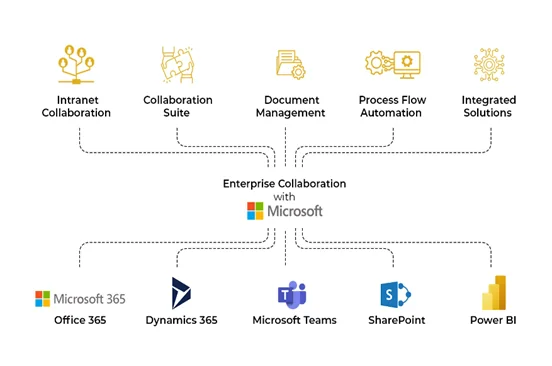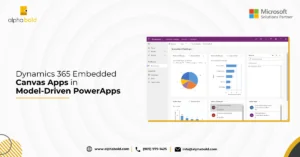Dynamics 365 and Microsoft Teams Integration for Hybrid Workforces

Gabriel Ramiro
Introduction
The COVID-19 pandemic, spreading globally in 2020, brought unexpected societal changes. The Coronavirus disease caused governments to mandate lockdowns and social distancing, leading many to stop working or transition to remote work immediately. This shift, while prioritizing safety, forced those working remotely to adapt to virtual tools to maintain stability and productivity. This blog explores how Microsoft Teams and Dynamics 365 integration reshape our understanding of work today.
With the distribution of the COVID-19 vaccine, restrictions have eased, but companies and workers realized the benefits of remote work. Remote workers experienced increased productivity and greater job satisfaction due to reduced commutes and the comfort of their personal spaces. This shift has prompted many companies to adopt a hybrid work model enhanced by well-developed online tools.
Software applications like Zoom, Slack, and Microsoft Teams played crucial roles during the pandemic, offering user-friendly communication and enhanced security measures. As remote and hybrid work continues to gain prominence, cutting-edge software solutions like Microsoft Teams and Dynamics 365 integration are becoming necessary. These tools facilitate collaboration and empower teams to achieve more regardless of location.
Microsoft Teams: Transforming Communication
Microsoft Teams continues to be essential for promoting the development of remote collaboration among individuals, with over 270 million monthly active users as of Q4 2021. Its easy-to-use interface facilitates seamless interactions for team members worldwide. This communication platform is renowned for its reliability, offering high-quality video and audio calls and real-time messaging that consolidate communication needs in a single, user-friendly hub. The Microsoft Teams and Dynamics 365 integration enhances these capabilities further.
Microsoft Teams’ flexibility in starting or joining meetings from anywhere is a standout feature. Whether beginning a meeting during a commute or transitioning to a laptop upon reaching the office, Teams ensures uninterrupted connectivity and productivity. Furthermore, Microsoft Teams and Dynamics 365 integration support virtual collaboration features such as virtual whiteboards and live reactions during meetings, promoting engagement and creativity among remote participants.
Moreover, the platform’s organized file-sharing capabilities enable users to easily exchange documents like meeting notes in Word or financial reports in Excel directly within chat channels. This streamlined feature enhances collaboration quality, bolstered by integration with OneDrive and SharePoint. The Microsoft Teams and Dynamics 365 integration provides instant access to the latest documents and resources, facilitating smoother workflows. Teams integrates seamlessly with a wide range of third-party applications, enabling teams to unify their workflows and boost productivity within the Teams interface.

These features, combined with its widespread adoption, underscore how Microsoft Teams supports seamless communication and file sharing, enhances virtual collaboration capabilities, and integrates effectively with third-party applications. This integration boosts efficiency and productivity for remote and hybrid workforces.
Experience Seamless Collaboration Today
Discover how Microsoft Teams and Dynamics 365 integration can transform your remote and hybrid work environment. Enhance communication, streamline workflows, and boost productivity with cutting-edge tools.
Request a DemoRemote Work Capabilities and Flexibility with Microsoft Teams and Dynamics 365 integration
Microsoft Dynamics 365 stands out for its remote work capabilities and flexibility. By enabling users to set up and customize their environments from any location, users can work on projects and customizations simultaneously. Like Microsoft Teams, Microsoft Teams and Dynamics 365 integration offers seamless accessibility via mobile phones or laptops with an internet connection, ensuring consistent quality and functionality. Its cloud-based nature allows remote access to customer information. For instance, Dynamics 365 Customer Engagement centralizes crucial data such as contact information, quote details, and appointments within its CRM, making this information accessible anywhere.
Additionally, Dynamics 365 offers extensive statistical analysis and reporting capabilities that help organizations gain valuable business insights. The platform leverages machine learning to analyze data and provide comprehensive evaluations. This feature is essential for remote workers as it allows them to monitor performance metrics and track customer interactions from a unified and accessible platform. By utilizing these analytical tools, businesses can be flexible in improving processes and enhancing customer satisfaction. The Microsoft Teams and Dynamics 365 integration is key to these enhancements.
Unlock the Full Potential of Remote Work
Empower your team to work efficiently from anywhere with Microsoft Teams and Dynamics 365 integration. Gain instant access to essential resources, improve collaboration, and stay ahead in a constantly changing world.
Request a DemoEnhancing Collaboration and Efficiency with Workflow Automation
Integration with other Microsoft tools and applications further enhances the remote work experience. Dynamics 365 integrates with tools like Outlook and SharePoint, easing real-time collaboration and always ensuring access to relevant data. This integration creates a unified environment where teams can efficiently share information and make informed decisions. The Microsoft Teams and Dynamics 365 integration streamline these processes.
Moreover, Dynamics 365 simplifies remote work through its smooth workflow automation capabilities. By reducing the need for tedious manual tasks, Power Automate within Dynamics 365 saves users and businesses precious time and allows them to focus on other areas. Workflow automation completes repetitive processes such as sending emails or completing activities, which is particularly beneficial for remote and hybrid work environments, where efficient task management is crucial. By automating repetitive tasks, Dynamics 365 enables teams from anywhere to focus on achieving business objectives.
For an in-depth look at various collaboration tools available in 2024, you can read 2024 Collaboration Tools: An In-Depth Comparison.
Transform Your Business with Modern Tools
Stay competitive and adaptable by leveraging the power of Microsoft Teams and Dynamics 365 integration. Optimize your processes, enhance customer satisfaction, and achieve your business goals effectively.
Request a DemoConclusion: Empowering the Future of Work
As companies allow for more remote and hybrid work in their business models, tools like Microsoft Teams and Dynamics 365 integration are increasingly crucial in improving collaboration and productivity. Whether a user is accessing customer records or working with others on projects, the cloud-based setup of Dynamics 365 allows remote access, letting employees work efficiently from the comfort of their homes. Dynamics 365 has the essential resources and tools for modern work environments.
When paired with Teams’ consolidated hub for communication, businesses can reach new heights in terms of productivity and success. As the workplace continues to change, it is important to embrace these modern tools to stay competitive and adaptable in a constantly changing world. The Microsoft Teams and Dynamics 365 integration ensures businesses can leverage the full potential of both platforms, enhancing their ability to collaborate, communicate, and achieve their goals effectively.
Further Reading: To explore how Dynamics 365 compares with other solutions, check out our detailed analysis in the blog Microsoft Dynamics 365 vs Competing Solutions.
Explore Recent Blog Posts






